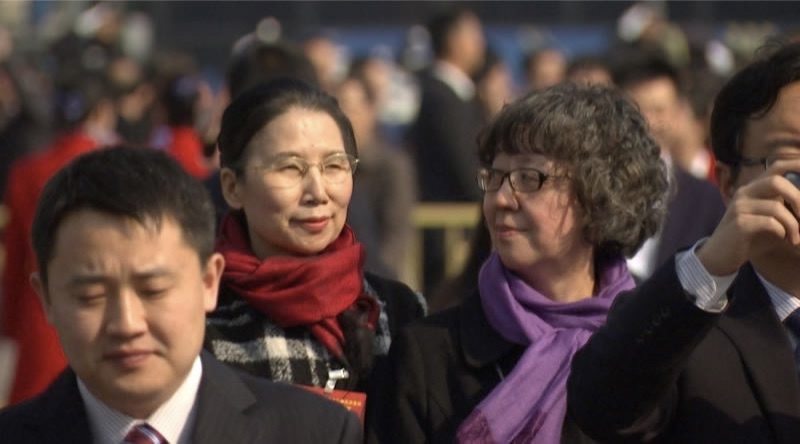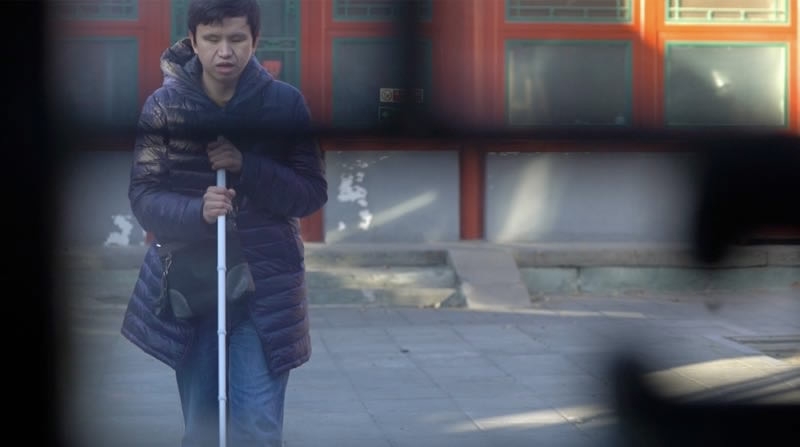杨佳:残疾人也应该享有平等权利
【字体:大、中、小】
【颜色:】
浏览量:...
Get the Flash Player to see this player.
Can I make a difference?
We are not defined by our abilities or disabilities, but by our choices.
Professor Yang Jia – the only visually impaired member of the Chinese People’s Political Consultative Conference (CPPCC) National Committee – embodies this saying so well.
“I think losing my sight has actually made me more determined to perceive what I want to do,” she tells CGTN correspondent Han Bin.
Known for her positive disposition, the 55-year old has not lost sight of this spirit, despite having battled being blind for over two decades now. Her optimism, according to her, partially stems from her being a member of the committee, citing it as a great platform for members to achieve their goals, and hers – towards a just society.
Yang believes she can make a difference in her capacity as a CPPCC member, being the only visually impaired member of the committee in history. She has submitted over 60 proposals in her past two terms as a political adviser, two of which have been implemented: pedestrian tracks for the blind and subtitles for CCTV’s Spring Festival shows.
Note that CPPCC members are not compensated for their contributions to the committee; rather, they do it voluntarily and in addition to their daily jobs.
我能改变吗?
我们不是由是否残疾决定的,而是由我们的选择决定的。
杨佳教授——中国人民政治协商会议全国委员会唯一的视障人士——体现了这一说法。
“我认为失去视力实际上让我更有决心去感知我想要做的事情,”她告诉CGTN记者Han Bin。
55岁的她以积极的性格而闻名,尽管在过去的20多年里一直在为失明奋斗,但她并没有忘记这一精神。对于她来说,她的乐观,部分来源于她是一名政协委员,政协是一个能够让委员们实现自身目标的很好平台,而她的目标是实现一个公正的社会。
杨佳认为,作为政协委员,她能够发挥自己的能力,成为历史上唯一一位视障人士。作为政治顾问,她在过去的两届任期内提交了超过60项建议,其中两项已被实施:设立盲道和央视春晚为聋哑人提供字幕。
政协委员的工作是没有补偿的;相反,在日常工作之外,他们是自愿履职。
Realistic and feasible proposals
Some quarters have questioned the real function of the 2,158-member strong CPPCC, citing, among other aspects, that it is a club for the "rich and famous," with criticisms on quality of proposals put forth.
Yang, who is now into her third term as a CPPCC member, says she has learned to come up with more effective proposals over the years. “We need to make more realistic proposals and feasible solutions,” she says.

Professor Yang Jia on her way to the Great Hall of the People (杨佳教授正在前往人民大会堂的途中。)/CGTN Photo
That – and to be more down to earth, as well as to look at things from both a macro and micro standpoint.
Ultimately, to measure how advanced a society is, Yang says to look at just two things: How does a society look at a person with disabilities, and how people with disabilities look at themselves.
现实可行的建议
一些人质疑这个由2158名委员组成政协会议能否真正发挥作用,并指出,它是一个富人和名人俱乐部,并对建议质量提出批评。
现在已经是三届政协委员的杨佳说,她已经学会了多年来提出更有效的建议。她说:“我们需要提出更现实的建议和可行的解决方案。”
从宏观和微观的角度来看,这都是为了更深入地了解社会。
杨佳说,衡量一个社会的进步程度只看两件事:社会如何看待残疾人,以及残疾人如何看待自己。
No-barrier cinemas in China
And herein lays her proposal for this year’s committee meeting, going back to basics: Yang wants to make cinemas accessible for the visually impaired.
To be sure, this concept isn’t completely new as the Xin Mu Theater in Beijing has been screening films for the visually impaired since 2005, where volunteers help interpret and narrate the movie.
But Yang deems this as not a true "inclusion," a notion she has been fighting for over the past decade. By “accessible” in her proposal, she means this disabled group is able to go to the movies – in shopping malls – just like anyone else.
“The cinemas can have a special space [such as a] booth for the visually impaired. When we watch the film, we can still hear both the background and description of the film. It’s achievable with today’s technology,” she says, noting that such a proposal has reportedly been executed in places in the United States, Europe and certain parts of Asia.
Zhang Gaoli, a fellow visually impaired citizen, calls for the same cause – to be able to watch the latest films in movie theaters.
“We are no different than anyone else. We have our own lives, except that we are visually impaired,” Zhang says.

Zhang Gaoli on his way to catch a movie at Xin Mu Theater(张高理(音译)正准备去辛木剧院看电影) /CGTN Photo
Professor Yang is hopeful and optimistic in pushing forward her proposal, and for this goal to be realized in the next five years.
“For the visually impaired, we can walk and talk, but we want to laugh and cry just as everyone else in the cinema. That’s true participation, from a cultural perspective,” she says.
“People are social animals. We enjoy going to the movies. It’s the sense of atmosphere. When we go to the movies, we get a glimpse of the real world,” adds Yang, who is a fan of the movies herself.
And her one barometer to know how advanced China is and will be? “Just by looking at this one aspect of accessible films,” she answers with a smile.
中国的无障碍电影院
谈及今年要提交的建议,杨佳想深入基层:希望让视障人士可以进入电影院。
可以肯定的是,这一概念并不是全新的,因为自2005年以来,北京的心目影院一直在为视障人士放映电影,在那里志愿者帮助视障人士解释和讲述电影。
但杨佳认为这不是一个真正的“包容”,她在过去的十年里一直在为之奋斗。她希望残疾人可以像其他人一样去购物中心看电影。
“电影院可以为视障人士提供一个特殊的空间(比如一个)展台。当我们看电影的时候,我们仍然可以听到电影的背景和描述。她说,这一提议已在美国、欧洲和亚洲某些地区执行。
张高理,一位视障人士,呼吁同样的事业——能够在电影院观看最新的电影。
“我们和其他人没有什么不同。我们有自己的生活,除了我们视力受损。
杨佳对推动她的提议充满希望和乐观,并希望在未来五年内实现这一目标。
“对于视障人士来说,我们可以走路和说话,但我们想要像电影里的其他人一样笑和哭。”从文化的角度来看,这才是真正的参与。
“人是社会的动物。我们喜欢看电影。这是一种氛围。当我们去看电影的时候,我们可以看到真实的世界,”杨佳补充道,她自己也是这部电影的粉丝。
如何衡量中国现在和未来发展?她笑着回答道:“只要关注电影这一方面就可以了。”
(杨佳是全国政协委员、九三学社中央常委、中国科学院大学教授,曾任联合国残疾人权利委员会副主席。)
